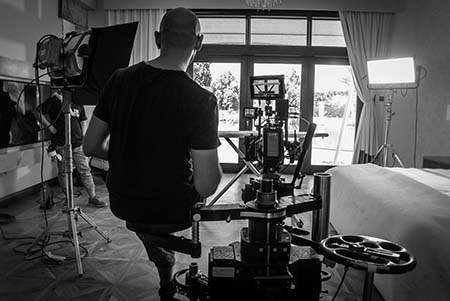Hayley Doyle meets up with Hazem Amin, founder and managing director of TreeHouse, a Dubai-based production house that offers professional helicam services As new production houses begin to mushroom in an already saturated market in Dubai, we see some looking to distinguish themselves by bringing more specialised services to the emirate. One such production house […]
 Hayley Doyle meets up with Hazem Amin, founder and managing director of TreeHouse, a Dubai-based production house that offers professional helicam services
Hayley Doyle meets up with Hazem Amin, founder and managing director of TreeHouse, a Dubai-based production house that offers professional helicam services
As new production houses begin to mushroom in an already saturated market in Dubai, we see some looking to distinguish themselves by bringing more specialised services to the emirate. One such production house is TreeHouse, which claims to be the first in the Gulf region to own a helicam and offer related services.
TreeHouse, with a name which triggers a playful picture of seclusion and imagination, knew it needed to offer something special in order to stand out from the crowd.
Sitting in the bright stylish, yet minimalistic studio based in Dubai Media Citys Shatha Tower, TreeHouses managing director Amin explains, We decided to do specialised filming techniques and so, introduced the first professional radio-controlled helicopter in the region.
Although TreeHouse offers regular services from pre-production through to post-production, using industry-standard equipment, Amin explains that this was not enough. Looking back at his experience, one skill including 32 flying hours training with Emirates Aviation Services as a student pilot, Amin created a concept to merge all of this together to craft the unique selling point for his company.
My film background, my technical ability and my flying knowledge helped me to invest in the helicam. If you do not know how to fly, you wont be able to fly the helicam; if you do not know how to film, you wont be able to imagine what the helicam is doing up there or what camera settings to use; and if you dont have the technical expertise, you wont know how to fix it, how to put it together or how to make it function properly. That combination encouraged me to invest in such a platform.
The most common name for the helicam is an octocopter, and it is the first of its kind in the region.
An unconventional helicopter with a total of eight propellers, it was designed in the US with German technology, assembled in the UAE at TreeHouse, and given the brand name Helicampro. A manually operated or fully operated GPS-controlled drone, Helicampro can be programmed to function alone or with a team of two people a professional camera operator with a pilots licence, and Amin himself.
It can fly as low as one metre above ground and up to 150 metres in altitude, with a 250 metre radius autonomously. With a maximum speed of 60 kilometres per hour, the Helicampro is obviously not your conventional helicopter. In addition to this service, TreeHouse has also invested in equipment for time-lapse professional filming.
A lot of people are undertaking time-lapse projects, but very few are doing time-lapse with a moving camera. Weve got equipment that allows the camera to move on a track or on a tripod with a rotating head.
The Helicampro can support a range of cameras including the Canon 5D Mark II, Blackmagic, Canon 300C and 500C, and the RED EPIC among others. Its body is made of composite carbon fiber, making it light-weight to carry and to fly, with an approximate weight of 3.5 kilograms and a payload of up to an extra three kilograms. Using a 5D Mk II on one battery charge, the helicam has a maximum flying time of 10 minutes.
The impressive buildings and architecture in Dubai are primarily seen by the human eye on ground level. According to Amin, we often see Dubais urban landscape from a height of 3000-4000 feet but when the camera levitates to 150 metres, we see a completely different perspective.
It shows you how beautiful the buildings are. It gives you a better idea of how they are put together and where you are going when you are walking, he says.
Amin has recently won a contract with Dubai Media Inc. to shoot all of its Ramadan fillers and has ongoing projects with the state broadcaster until 2013.
Filming the latest project for DMI, Amin recalls the biggest challenge being the weather. Technology is usually developed in the West, or in areas where the climate is a little bit more moderate, so in Dubai there were a lot of helicam mishaps with overheating parts initially, he admits.
The helicam is a very delicate piece of equipment. We were filming in the desert in Hatta and it went haywire suddenly. We had to fix it on the spot and our expertise extends that far, he explains.
Amin and his team shifted the actual shot from day to night, completely changing the original daytime shoot. Since the operating temperatures were not normal for such a device, an improvised solution resulted in attaching an additional fan to cool that piece of equipment. Yet, they still managed to have it fly under these circumstances.
Soumaya Bellafquih, who hails from Morrocco and heads production at TreeHouse says discipline is key to all productions.
You cannot make work happen if you dont know what team work is, whether its a short documentary, corporate video, or a TVC. Its the same discipline. You have to learn to accommodate needs and learn how to be creative within your budget. The process, however, is always the same.
TreeHouse has, thus far, undertaken productions in the UAE, Saudi Arabia and Jordan although the helicam has only been used in Dubai so far. It has been used to capture some of Dubais major world attractions including the Madinat Jumeirah, Burj Al Arab, Dubai Creek Park, the Palm, and Burj Khalifa. Amin adds that Dubai is one of his favourite locations to shoot.
A lot of people say there arent that many locations in Dubai if you want to find something old and rustic, he says, but you can find it, you just need to look. If Tom Cruise came to film here, its because of the uniqueness of this place. We live in a beautiful place that has a lot of offer.
TreeHouse was born out of Amins desire to launch his own production house and business. Born in Jordan and of Palestinian origin, Amin studied computer science at the University of Jordan, but grew up surrounded with media people his father being a television presenter on Jordan TV and his mother a Radio Jordan broadcaster.
That environment combined with his understanding of computers initially led him into the world of animation. But gradually, his fascination with lights and cameras led him to undertake courses in cinematography.
This led to stepping away from animation and becoming part owner of Telemax, the biggest production company in Jordan. Amin moved on from Jordan eventually to MBC Group in Dubai, where he worked for more than five years before he left the corporate world for TreeHouse.
Many people thought that Amin was crazy to start up his own business in August 2010, right in the middle of the financial crisis. However, he believes that thinking too much about a business model and overdoing calculations can result in never starting up at all.
Although resources were not that abundant, they were more easy to acquire due to the crisis, and overheads were much lower than if it had been peak time.
The company remains small, with just five full-time employees a producer, sound engineer, personal assistant, driver and the managing director, and TreeHouse relies on all of the talented freelancers Dubai has to offer.
Amin says there are some really good talents, especially directors of photography and gaffers in Dubai.
A project is already lined up for TreeHouse to shoot a helicam scene for Al Arabiya, MBCs news channel. Amin says he would like to see his company expand in several directions.
Commercial production is not the only way for the helicam to display its usages, and there are plans to go into real estate, hospitality, events, fairs, and any production that can be covered from the sky.
Within five years, I hope to have a fully-fledged, sophisticated production house, capable of creating more room for creative people to produce, says Amin.
We still want to go towards specialised filming and intensely invest in that, introducing reliable platforms that allow creative people to think in a different way.
Amin remains positive about the future of production in the Middle East.
Although there are many assumptions about the limitation of creativity in the region with people being cautious in experimenting, he believes that the bar can always be raised and that production in this part of the world is heading towards a better future.
Independent filmmakers are becoming more abundant and people are expressing their ideas and creativity more. The Gulf, as a whole, has a very high purchasing power at the moment compared to the rest of the world. They are acquiring almost everything. British football teams are being bought, Dubai Ports owns half of the most important ports around the world, so people need to pay a little more attention to this region because of its power and how it is entering every other place in the world. The film industry is growing as much as the place is growing.
TreeHouse is aspiring to its name, reaching new and playful heights. We hope it continues to fly.


































































